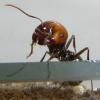A question to the experienced Camponotus keepers out there.
This week, I bought a small founder colony of Camponotus piceus.
This is a small European species with small colony sizes (average colony size of mature colonies up to 200 workers, rarely they get bigger).
The colony is from last year.
Right now, there are 6 workers and one queen and some larvae.
The seller from whom I got the girls from luckily provides A LOT of information on his website, and the says the following about the colony growth in this species:
- 1st year 5-20 workers
- 2nd year 20-100 workers
- 3rd year several hundred.
Looking at these numbers, this is a HUGE discrepancy.
I have seen that Camponotus grow slower than other species.
What are your experiences?
What are the reasons for these wildly differing numbers? After all, 100 workers are 5 times more than 20!














